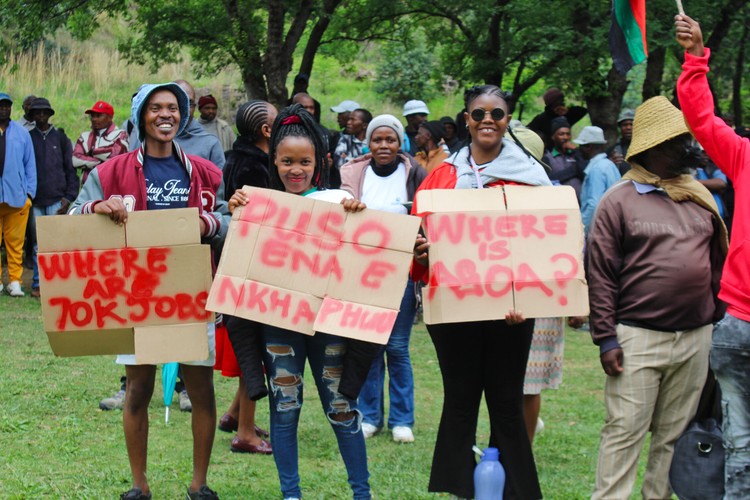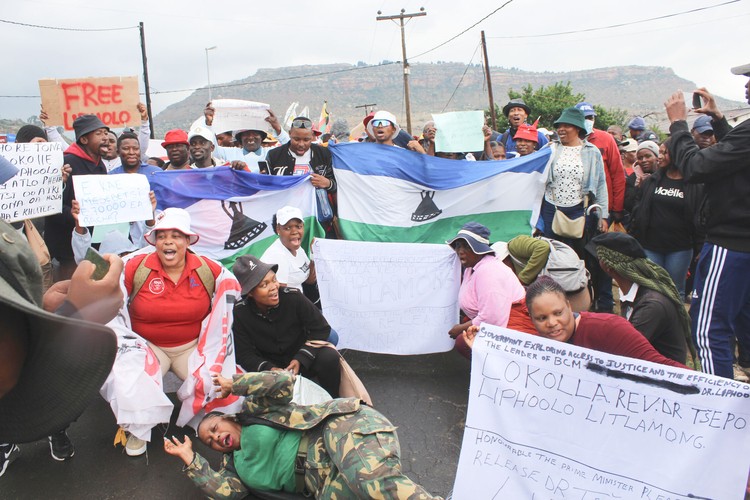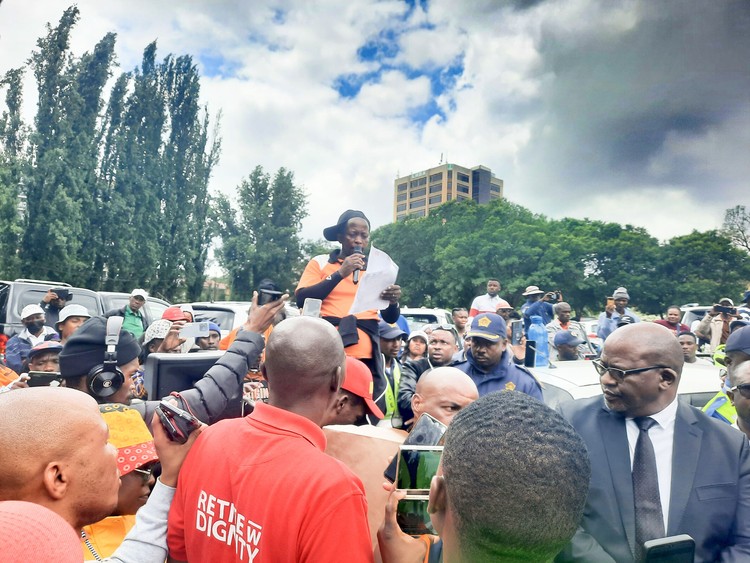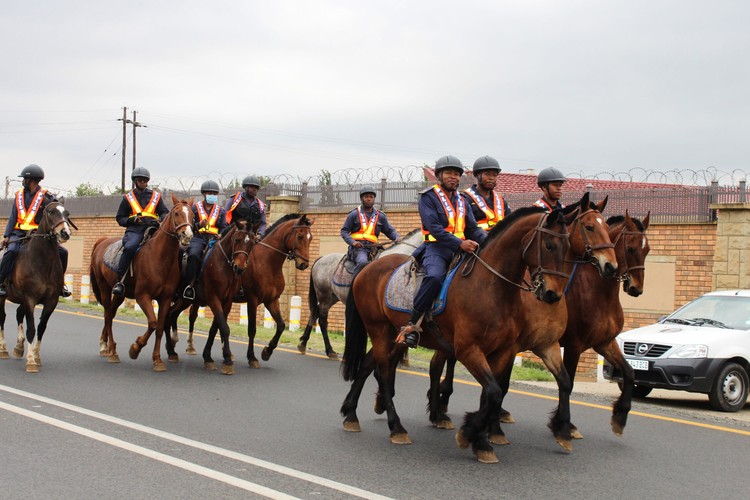Workers march in Maseru as AGOA uncertainty threatens thousands of jobs
Protest, originally banned, proceeded after police minister gave it the go-ahead
Protesters hold signs calling for the AGOA trade agreement with the United States to be saved. Photos: Sechaba Mokhethi
Hundreds of garment-factory workers marched through Maseru on Friday, demanding urgent government action to save Lesotho’s collapsing textile industry. The march comes as uncertainty about the renewal of the African Growth and Opportunity Act (AGOA) deepens fears of job losses.
AGOA is a trade agreement with the US that allows duty-free exports of Lesotho-made garments to the American market. Workers said that without AGOA, tens of thousands of jobs would disappear, leaving families and entire communities that depend on the industry in hunger.
“Where is AGOA?” and “Renew AGOA and stop job losses,” read banners waved through the capital as mostly women workers, joined by trade-union leaders, youth and consumer groups, marched from Sethaleng-sa-Mopapa to Sefikeng-sa-Moshoeshoe in Maseru.
Most of the protesters were women, who make up the bulk of garment workers.
The demonstration was organised by a coalition of unions after a tense standoff with police earlier in the week. Police had initially refused to issue a permit, but the police minister intervened on Wednesday, allowing the march to proceed after workers threatened to go to court.
The march set off at 10am from Sethaleng-sa-Mopapa, weaving through Katlehong before converging at Sefikeng-sa-Moshoeshoe. Organisers estimated about 400 workers and supporters joined the procession.
Union leaders said the protest was a desperate appeal for action as factories continue to shut down. “Our products go straight to the USA,” said Matanki Mosotho, a shop steward at Precious Garments. “If AGOA is not renewed, our factory will close and hundreds will lose their jobs.”
The workers’ petition calls for robust government efforts to renew AGOA and protect the livelihoods of the more than 30,000 people employed in the textile sector. It also demands measures to curb unemployment.
“As the government prepares to fight the high unemployment rate, on 1 December we request an unemployment allowance of M1,000 (R1,000). If we do not get it by that date, we will be here again on 3 December so that we can go to Christmas with food and clothing,” the petition states.
Sam Mokhele reads the petition.
Beyond AGOA, National Clothing Textile and Allied Workers Union General Secretary Sam Mokhele, who was presenting the petition, raised long-standing grievances about unsafe working conditions and the government’s failure to uphold labour rights.
Protesters urged for Lesotho’s labour laws be brought in line with international standards, saying too many factories operate without accountability.
They also called on the labour ministry to hire and equip more inspectors to monitor workplaces and protect employees from dishonest factory owners. They cited the case of Ace Apparel in Maputsoe, where factory owners vanished, leaving about 1,500 workers unpaid.
“These investors were brought by the government, and if it cannot trace them or recover our benefits, then the government must take responsibility and pay us,” the petition read.
The petition also urged the government to negotiate with the United States to reduce tariffs, as other AGOA-eligible competitors have done, to safeguard investors and protect remaining jobs.
The march drew street vendors, youth groups, and consumer associations, who expressed solidarity with the workers. Vendors said they had been forcibly removed from their trading spaces in Maseru and Roma as part of road renovation projects under the government’s “tidy and neat” campaign.
Regarding vendors, the petition said: “Your government has chased us away from the places where we used to earn a living, without providing an alternative trading space. If by 15 November the government has not responded, we will return to our usual spots and will only move once we are given a proper alternative.”
Consumer groups joined the protest to demand lower electricity prices, calling for the domestic rate to be reduced from M2.20 to M1 per unit.
At one point police ordered the protesters not to fly the flag of Lesotho.
On behalf of Prime Minister Sam Matekane, Minister in the Prime Minister’s Office Limpho Tau received the petition and commended the protesters for “exercising their rights lawfully in a democratic dispensation”. He promised to deliver their grievances to the prime minister and initiate discussions with all parties involved.
Police on horses monitored the protest.
Support independent journalism
Donate using Payfast

Don't miss out on the latest news
We respect your privacy, and promise we won't spam you.
Next: Cape Town shack dwellers march in city centre for services
Previous: Outrage over police inaction after woman goes missing
© 2025 GroundUp. This article is licensed under a Creative Commons Attribution-NoDerivatives 4.0 International License.
You may republish this article, so long as you credit the authors and GroundUp, and do not change the text. Please include a link back to the original article.
We put an invisible pixel in the article so that we can count traffic to republishers. All analytics tools are solely on our servers. We do not give our logs to any third party. Logs are deleted after two weeks. We do not use any IP address identifying information except to count regional traffic. We are solely interested in counting hits, not tracking users. If you republish, please do not delete the invisible pixel.




